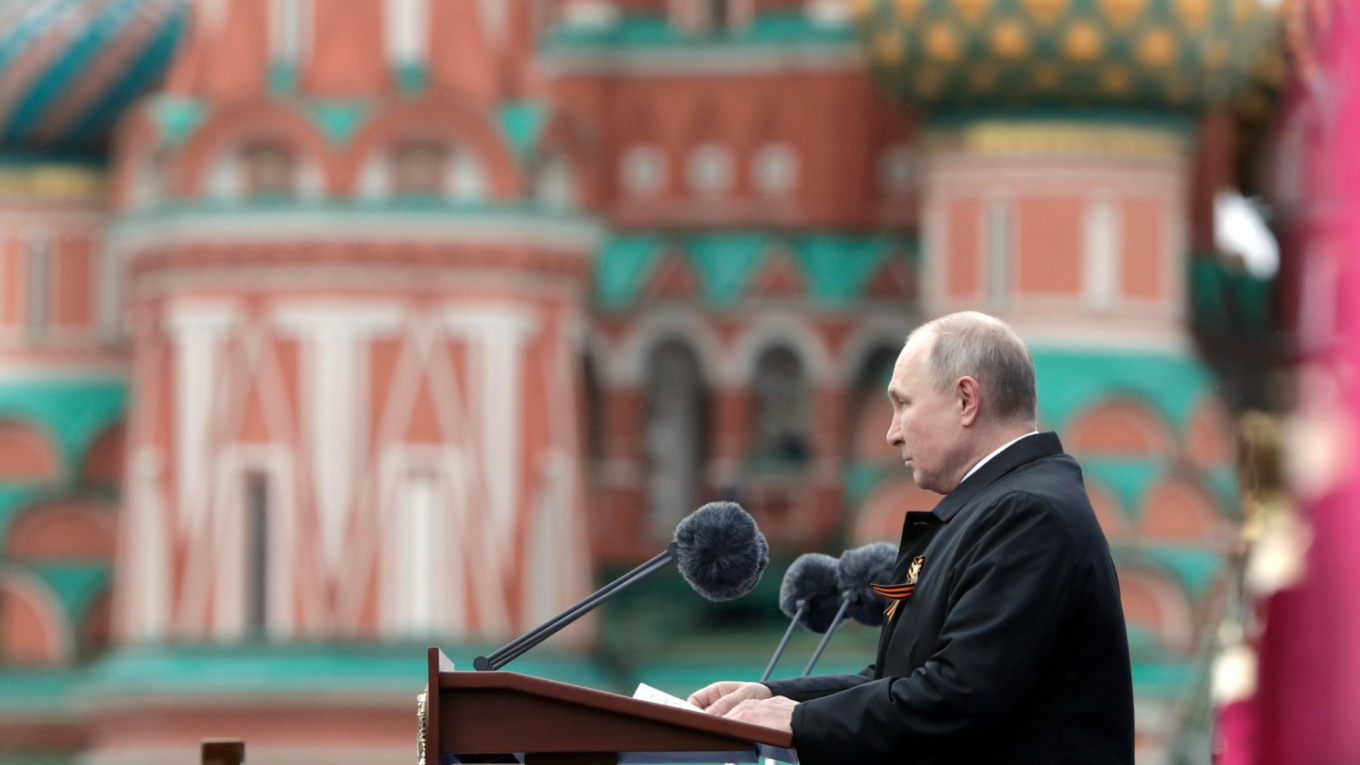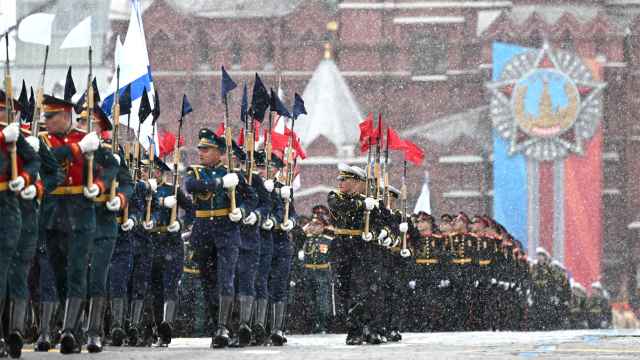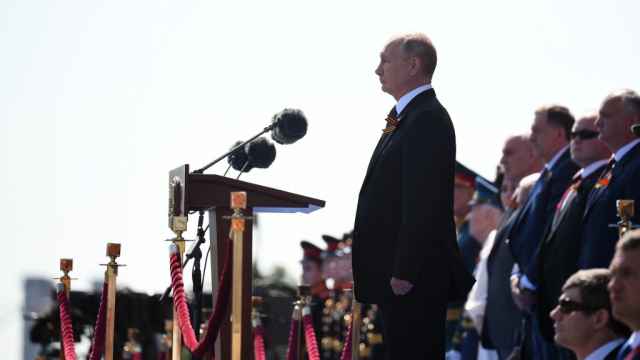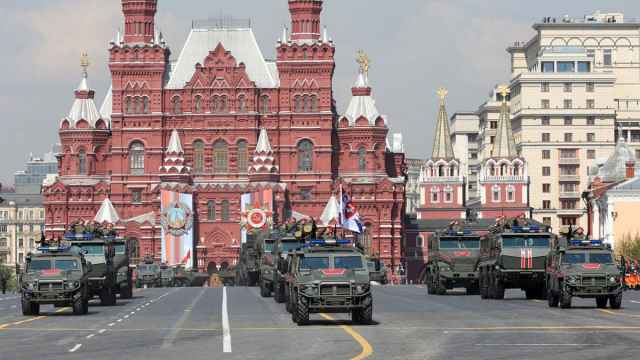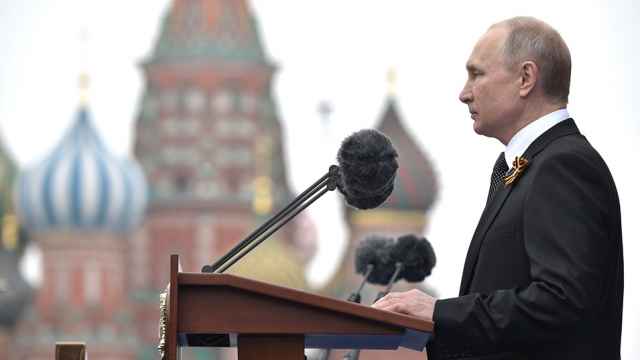President Vladimir Putin on Sunday vowed Russia will "firmly" defend national interests and denounced the return of "Russophobia," as the country marked the 76th anniversary of victory in World War II.
His speech to thousands of soldiers and veterans on Red Square came as recent tensions between Moscow and the West have recalled the Cold War over the conflict in Ukraine and a litany of spy scandals in Europe.
"The Soviet people kept their sacred oath, defended the homeland and freed the countries of Europe from the black plague," Putin told the crowd.
"Russia consistently defends international law. At the same time, we will firmly defend our national interests to ensure the safety of our people," he said.
The Russian leader also condemned what he called a creeping return of ideologies of the time, when "slogans of racial and national superiority, of anti-semitism and Russophobia, became ever more cynical."
His speech came at the start of an annual parade that sees military hardware roll through the streets of Moscow.
More than 12,000 military personnel took part in Sunday's parade, as well as some 190 pieces of military equipment and 76 fighter jets and helicopters.
Victory Day parades, which only became an annual event after the collapse of the Soviet Union in 1991 and have taken on increasing importance in projecting Russia's renewed military might during Putin's two decades in power, also took place Sunday in dozens of cities across the nation.
'Victory of the entire Russian people'
A survey this week by state-run pollster VTsIOM showed that 69% of Russians view Victory Day as the most important holiday on the calendar.
A third of respondents said they would take part in the celebrations, while a fifth said they would watch on television.
"For me and my family, this holiday marks the victory of the entire Russian people," Yulia Gulevskikh, a 31-year-old accountant told AFP in the Far East city of Vladivostok.
"We are proud, remember and honour all our relatives and friends. And all the brave soldiers," she added, noting she was happy the parade took place despite pandemic measures.
This year's Victory Day was the second during the coronavirus pandemic.
Russia has lifted nearly all of its measures to limit the spread of the virus, though a ban remains in place on mass gatherings in most regions.
As of Sunday, total infections stood at nearly 4.9 million and fatalities at over 113,000, according to a tally by health officials.
But authorities have been criticized for downplaying the severity Russia's outbreak by counting only fatalities where the coronavirus was found to be the primary cause of death after an autopsy.
Figures released by Russia's statistics agency last month showed that the country had actually recorded some 250,000 virus-related deaths by the end of March.
Tensions with the West
Sunday's commemorations came as Russia in recent weeks has seen its diplomats expelled from a clutch of European countries over espionage scandals, while the United States and the European Union have levied new sanctions on Moscow over the treatment of jailed Kremlin critic Alexei Navalny and allegations of hacking and cyberattacks.
Tensions have also soared over the conflict in eastern Ukraine, which erupted after Russia annexed Crimea in 2014 and where Moscow is widely seen as backing pro-Russia separatists.
Clashes between the government and separatists have been intensifying since January in a conflict which has claimed more than 13,000 lives.
Russia last month amassed 100,000 troops near Ukraine's borders and in Crimea, its biggest buildup since 2014, though it quickly announced a drawdown in what many saw as a test for new U.S. President Joe Biden.
Earlier this week, U.S. Secretary of State Antony Blinken flew to Kiev in a show of support for Ukraine against Russia, and before an expected summit between Putin and Biden next month.
On Saturday, Ukrainian President Volodymyr Zelenskiy traveled with European diplomats to the pro-Russian breakaway eastern region of Lugansk to commemorate the end of WWII.
A Message from The Moscow Times:
Dear readers,
We are facing unprecedented challenges. Russia's Prosecutor General's Office has designated The Moscow Times as an "undesirable" organization, criminalizing our work and putting our staff at risk of prosecution. This follows our earlier unjust labeling as a "foreign agent."
These actions are direct attempts to silence independent journalism in Russia. The authorities claim our work "discredits the decisions of the Russian leadership." We see things differently: we strive to provide accurate, unbiased reporting on Russia.
We, the journalists of The Moscow Times, refuse to be silenced. But to continue our work, we need your help.
Your support, no matter how small, makes a world of difference. If you can, please support us monthly starting from just $2. It's quick to set up, and every contribution makes a significant impact.
By supporting The Moscow Times, you're defending open, independent journalism in the face of repression. Thank you for standing with us.
Remind me later.


